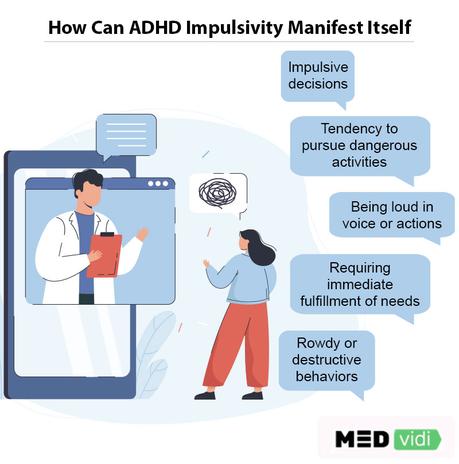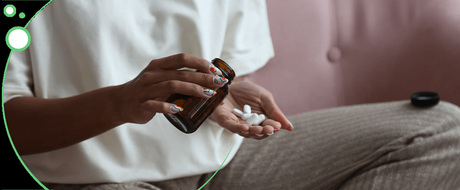Effects, and Management Tips
- 9 January, 23
 ADHD
ADHD Impulsivity: Its Types, Effects, and Management Tips
ADHD
ADHD Impulsivity: Its Types, Effects, and Management Tips
ADHD is a diverse cognitive condition that manifests behaviorally in many ways, including impulsivity. It is a common symptom among those adults diagnosed with predominantly hyperactive ADHD. Even though the prevalence of hyperactivity in adults is lower since it tends to decline with age, it can still occur.
It’s vital to carefully assess if you have this symptom because ADHD impulsivity can affect the functionality and the quality of your life in different ways. Read on to learn more.
Over the course of your life, your symptoms of ADHD may change. Consult a professional for an assessment and advice.
Get ADHD Treatment OnlineWhat Does Impulsiveness Mean?
Impulsivity is the tendency to act without thought or planning and without considering the potential consequences. Impulsivity reveals itself in a range of behaviors in children and adults with attention-deficit/hyperactivity disorder (ADHD).
Of course, some people may experience impulsiveness more severely than others, particularly if they are more likely to have the hyperactive-impulsive subtype of the disorder than the inattentive subtype.
Types of Impulsivity
ADHD impulse control issues can be divided into four main types depending on how the action develops and the motivations behind the impulsive activity. Here is a little explanation to give you some background information on this:
- Motor impulsivity. This kind is connected to an individual’s unexpected acts or outbursts. People with this type are restless and need help sitting still or frequently perform behaviors that are likely to draw attention.
- Emotional impulsivity. Individuals do this when they base a choice on their feelings. This kind of impulsivity increases one’s tendency to be impatient, irritable, or easily angered. Emotional dysregulation, one of the symptoms of ADHD, should be addressed in this case.
- Sensory impulsivity. Individuals struggle to digest information when dealing with this type of impulsivity. They need help sifting through unimportant information and need to be more focused.
- Cognitive impulsivity. It typically entails a lack of clarity of thought or attention to detail. It also makes a person more likely to act hastily, act without thinking, or forget things, all of which might lead to future issues.
Adult ADHD and Impulse Control Issues: The Connection Explained
The thalamus region of the brain regulates response inhibition. It functions like a gate, providing signals to permit or prohibit certain behaviors. The limbic-hippocampal connections of the brain transmit a warning from the thalamus to the frontal cortex when it notices a red flag. That is the part of the brain that regulates problem-solving and emotional expression.
This thalamus gate might be impaired in people with ADHD. As a result, a person can find it difficult to restrain short-term urges, such as the desire to eat an extra candy or spend more money than planned.
ADHD comes in many forms. Consider getting professional help if you want to manage the symptoms effectively.
Consult A Doctor OnlineHow Impulsivity Can Impact One's Life
Symptoms of impulsive ADHD issues in adults might include but are not limited to actions like:
- Making impulsive decisions
- Pursuing dangerous activities
- Requiring immediate fulfillment of needs
- Being loud in voice or actions
- Having a generally rowdy behavior, possibly even destructive
- Willing to finish tasks and projects before moving on to other ones
Beneficial outcomes do not always follow impulsive actions. Regular and recurrent impulsivity is frequently seen as a sign of a more serious problem, especially when it results in injury to oneself or others.
As a result of impulsive behavior, the following effects are most frequently observed:
- Uncontrollable urges. Impulsive behavior can result in an inability to control an urge, temptation, or desire. It can also occur in the form of an obsessive need to engage in a particular action damaging to oneself or others.
- Heightened stress. ADHD and impulse control problems can lead to stress. Before conducting the act, impulsivity can heighten the sense of arousal.
- Antisocial personality. According to research, impulsivity is linked to antisocial personality. It can also increase the risk of developing an antisocial personality disorder. This disorder is characterized by a total disregard for the consequences of one’s actions and the feelings of other people.
- Temperament issues. Impulsive people are sometimes characterized as hot-headed, rash, and unstable. The feelings of inadequacy that surface with unstable emotions, behaviors, and relationships can be difficult for impulsive people to deal with. They could be quick to react angrily to perceived injustices and frequently fail to realize when their feelings are unjustified or exaggerated.
- Unacceptable behaviors. Adults with poor impulse control may be prone to exhibit behaviors such as unrestricted gaming, the compulsion to shop, pyromania (an impulse to set fires without considering consequences), internet addiction, or hypersexuality.
- Development of other conditions. Chemical alterations in the brain’s frontal lobe are responsible for troubles with impulse control. Dopamine specifically is involved in these alterations. You can be more susceptible to more severe impulse control problems due to these changes. Examples of conditions that are related to impulse control include the following:
- Bipolar disorder
- Obsessive-compulsive disorder (OCD)
- Substance abuse
Consult a competent doctor in your area to receive a personalized treatment plan.
Book An Appointment
Managing Impulsivity
Although impulsivity can be difficult to control sometimes, it is manageable with the correct tools and some effort. You can learn how to recognize your triggers and how to control impulsivity caused by ADHD by using the following tactics:
- Recognize and accept your impulsiveness.
- Develop your self-awareness.
- Limit or prevent risks.
- Communicate more with loved ones.
- Notice your impulsive behaviors to change them.
- Consult a professional.
Final Words
Even though it can occasionally seem quite difficult, controlling ADHD impulsivity is possible. Seeking the assistance of a mental health professional who can help you develop a treatment plan is the first step to managing your impulses. The ADHD specialists at MEDvidi are at your convenience at any time.

Real help for ADHD.
Beat your symptoms with our expert advice.





- ADHD and impulse control
- ADHD help
- ADHD Impulsivity
- Attention deficit hyperactivity disorder (ADHD)
- Impulse Control
- Impulsivity Strategies
- What is ADHD
